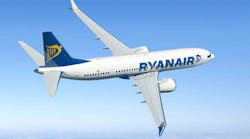Boeing Commercial Airplanes cut production its 737 series narrow-body aircraft by about 20% as it diverts resources to correct the cause of two fatal crashes of 737 MAX jets in the past six months. The top-selling aircraft was involved in crashes for Indonesia’s Lion Air jet in Indonesia, in October 2018, and Ethiopian Airlines in March. A total of 346 deaths are listed in the two incidents.
The cut in production will scotch an earlier plan by Boeing to increase the monthly production rate to 57 aircraft/month later this year, as it seeks to fulfill a very large backlog of orders for the 737 MAX.
The 737 MAX fleet has been grounded by airlines and aviation regulators around the world. Boeing has taken over 5,000 orders for the twin-engine jets since introducing it in 2011, and 376 have been delivered since the commercial debut in 2017. At least one airline has canceled its order, and Boeing has halted all 737 MAX deliveries.
The crashes have been attributed to a particular "anti-stall" software developed for the 737 MAX to off-set the effect of more fuel-efficient engines adopted for the new version of the 737, but which because of their larger size alter the planes’ aerodynamic behavior: the Maneuvering Characteristics Augmentation System (MCAS) software apparently responded to inaccurate flight data and sent the two planes into nose dives that the crews were unable to reverse.
The new-aircraft assembly reduction from 52 to 42 aircraft/month was announced in a statement by CEO Dennis Muilenburg. In that statement, the CEO also noted that Boeing is working with customers and global regulators to return the 737 MAX to service.
“We now know that the recent Lion Air Flight 610 and Ethiopian Airlines Flight 302 accidents were caused by a chain of events, with a common chain link being erroneous activation of the aircraft's MCAS function. We have the responsibility to eliminate this risk, and we know how to do it. As part of this effort, we're making progress on the 737 MAX software update that will prevent accidents like these from ever happening again," Muilenburg stated.
“Teams are working tirelessly, advancing and testing the software, conducting non-advocate reviews, and engaging regulators and customers worldwide as we proceed to final certification,” he continued.
Muilenburg also indicated Boeing will establish a committee of directors to review how the organization develops and builds aircraft. And, he said Boeing is coordinating with customers and suppliers to minimize the operational and financial effects of the "production rate change."






